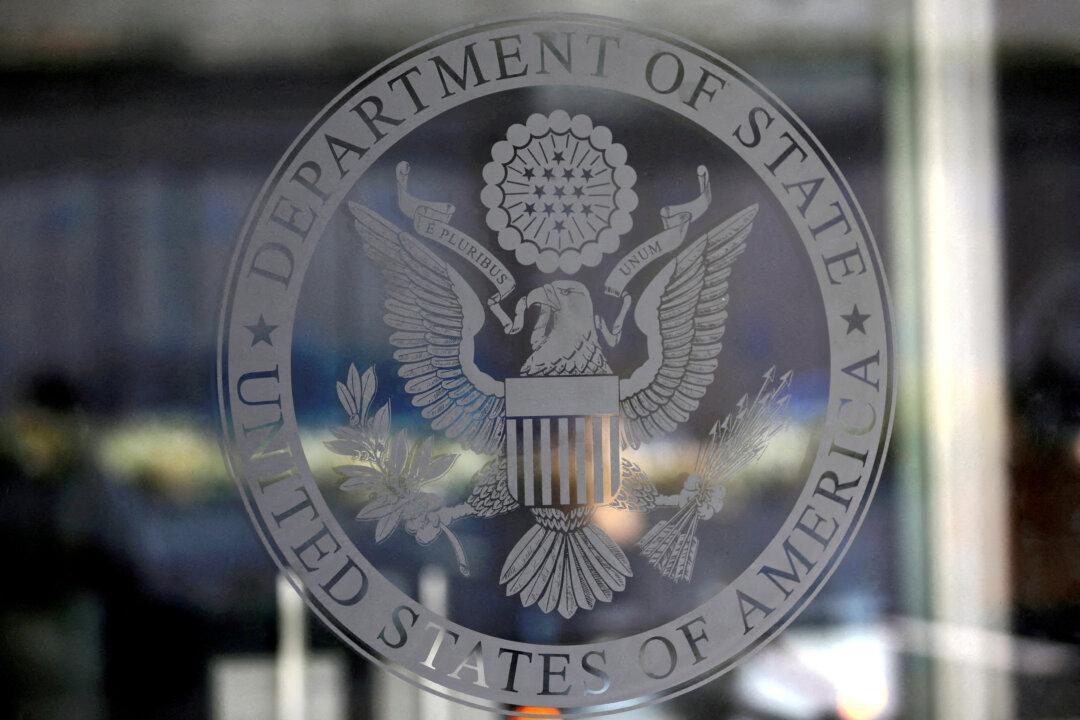
The seal of the U.S. Department of State in Washington on Jan. 26, 2017. Joshua Roberts/Reuters
The United States will implement a new visa restriction policy targeting the relatives and business associates of foreign nationals sanctioned for drug trafficking, Secretary of State Marco Rubio said on Thursday.
The new visa policy comes as the Trump administration ramps up efforts to curb the flow of fentanyl into the United States.
Rubio said that the administration aims to prevent “drug traffickers, their family members, and close personal and business associates” from entering the country as part of an effort to deter illicit drug operations.
“The fentanyl crisis in the United States is unprecedented, with overdoses remaining the leading cause of death for Americans ages 18 to 44,” Rubio said in a statement.
“The U.S. Department of State will use all necessary tools to deter and dismantle the flow of fentanyl and other illicit drugs from entering the United States and harming U.S. citizens,” he added.
The policy will “expand upon existing tools” and be implemented under the Immigration and Nationality Act, according to the statement.
More than 107,500 overdose deaths were recorded in the United States in 2023, most of which were linked to fentanyl, according to the Centers for Disease Control and Prevention. Provisional CDC data indicate there were an estimated 80,391 drug overdose deaths in the United States during 2024. That is an average of more than 220 overdose deaths per day last year, the State Department said.
To tackle the fentanyl flow, President Donald Trump imposed tariffs on Mexico, Canada, and China to pressure them into taking stronger actions to curb fentanyl trafficking into the United States.
“Vast amounts of fentanyl have poured into our country from Mexico, and as you know, also from China, where it goes to Mexico and goes to Canada,” Trump told reporters on March 3.
On June 12, the House of Representatives passed a Senate bill in a 321-104 vote to reclassify fentanyl as a Schedule I drug under the Controlled Substances Act.
Under the bill, new fentanyl-related offenses are established, with 100 grams or more triggering a mandatory prison sentence with a minimum of 10 years. The legislation also establishes a new registration process for research with controlled substances.
Schedule I drugs “may not be prescribed, dispensed, or administered” by physicians, according to the National Institutes of Health, which means fentanyl will be pulled from medical use in the United States if the president signs the bill.
Lawmakers have also introduced regulations to combat the fentanyl flow. In March, Rep. Dan Newhouse (R-Wash.) introduced a bipartisan bill to establish a federal joint task force to tackle fentanyl trafficking by streamlining interagency collaboration.
Newhouse stated that the task force will “pool resources” across the federal government to respond to fentanyl trafficking with sanctions and joint raids. It will focus on both international and domestic efforts to dismantle drug trafficking networks, including developing strategies to address China’s involvement in the fentanyl crisis.
T.J. Muscaro contributed to this report.


إرسال تعليق